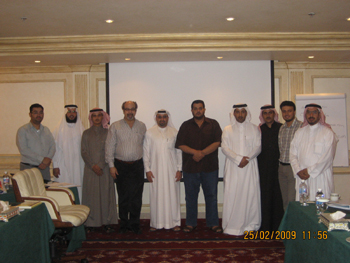MMSS II: 2-DAY Advanced Management Skills for Maintenance Supervisors, Team Leaders and Managers (Part II)
Our continuing course for building supervisory, management and team skills reviews the topics offered in our 2-day Basic Course and builds on it by introducing new productivity techniques and additional managerial and leadership skills for success.
Learn how successful supervisors motivate maintenance workers in organizations throughout the world. Advanced time management: Includes setting priorities, self-discipline techniques, 20 time savers, and additional resources for improvements. How and why to work efficiently from a clean desk and a master to-do list. How to increase the bang for your training dollar by determining who in your workgroup would benefit the most from training; how to establish real craft training for your crew. Evaluate and improve your face-to-face communication skills. Learn the seven daily habits of successful supervisors. Learn how to run meetings. Improve the delivery of maintenance service to your own users.
This course builds on the material in MSMS I Management Skills for Maintenance Supervisors, Team Leaders and Managers (either 2 or 3 day).
These carefully chosen topics will increase the effectiveness of your managers and supervisors:
- Viewing yourself as "coach" to help employees improve performance
- Apply the Deming approach to improve quality in your maintenance operations
- Proven methods for reducing overall maintenance costs via effective training and supervision
- Guidelines for planning and implementing a comprehensive training program
- Easy-to-use techniques for improving your "Maintenance IQ" and your value to your organization
- Basics of RCM
- Shutting down plants and production lines - a short course
- Ten steps to eliminating time killers
- Techniques for improving one-on-one communications with employees, peers, and superiors
- How to improve employee motivation by examining actual case studies
- Lean Maintenance
- Ways to deal with cultural diversity in your department
- Guidelines for developing training programs for special skills
- The seven daily habits of the highly productive and successful maintenance supervisor
- How to design and implement on-the-job training programs to get the best results
Program includes a 100+ page spiral-bound workbook to help each attendee take notes and develop their own action plan for moving forward.
Course Agenda - Day 1
How to supercharge your time: Building on the time-management concepts from the prior course, we build specific projects to help the participants manage their time, one of the scarcest resources around. We emphasize implementing the daily habits of highly successful supervisors plus other techniques for personal planning and improved productivity of managers and leaders.
Lean maintenance techniques: Lean maintenance is one of the hottest concepts among world-class organizations today. In a world of tight budgets and scarce resources, how do you cut unnecessary procedures and resource waste while delivering the same (OR HIGHER!) level of quality to your user groups? Includes discussion on getting your employees involved in reducing waste.
Learn how successful maintenance supervisors motivate their work groups: Covers the latest ideas on motivation, introducing strategies of success¬ful motivation techniques compiled from actual maintenance crews. Answers the important question, how can a maintenance supervisor motivate the workgroup?
Everything you need to know about craft training: Teaching and coaching. Issue: how to run a 21st century organization with 20th century skills, worksheets, checklists, techniques, suppliers. How to get the most from people through training. Measuring the effectiveness of training efforts.
Workshop in teaching and coaching: Students use worksheets and checklists to design an actual skills training exercise. Students can use the materials they prepare in this exercise when they return to their own workplace
Course Agenda - Day 2
Maintenance quality: How to insure quality of services provided. Introduces Deming's guide to quality. Seven deadly diseases that interfere with high-quality provision of services and how to avoid or unroot them inside your organization.
Root cause analysis: One of most efficient methods for determining what went wrong in the event of an unexpected breakdown. Introduction of general principals, the five "whys," and discussion of real-life examples. Participants are introduced to the techniques and tips for implementation.
Communication workshop: Workshop in communications. Improve your ability to get your point across. Make sure you can be understood by maintenance workers. How are you as a communicator? Exercise in improving your communica¬tion skills.
Putting it all together: Participants put all the information together and develop an action plan for suc¬cess. They will leave the workshop with resources to continue adding value to their organization and improving their Maintenance I.Q. through selected readings and resources.


